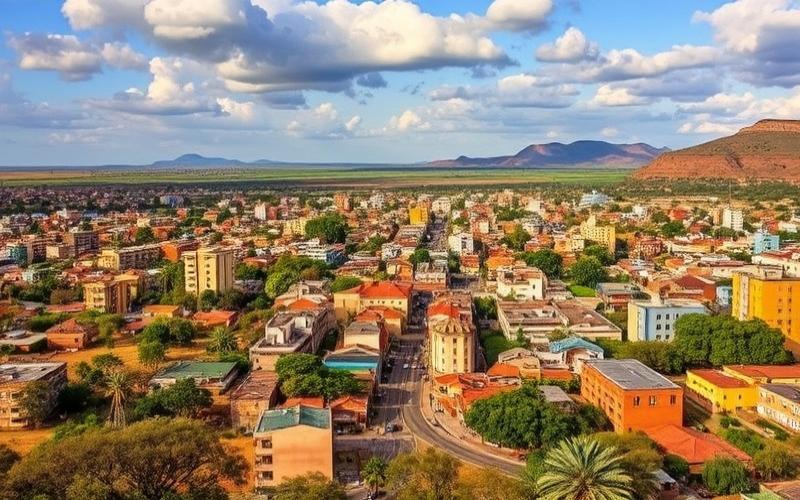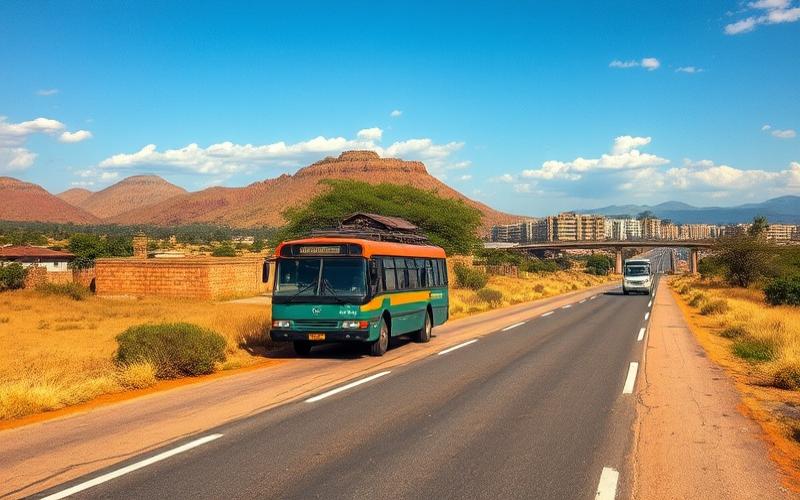
 Published on and written by Cyril Jarnias
Published on and written by Cyril Jarnias
Obtaining permanent residence in South Africa is a topic of growing interest among those wishing to settle in this country rich in cultural diversity and breathtaking landscapes.
In this article, we will explore the essential criteria to meet to secure this valuable South African green card, while highlighting the numerous benefits this status provides, such as easier access to the job market or top-tier educational institutions.
Understanding the ins and outs is essential for anyone considering making South Africa their new home, and this detailed guide aims to illuminate the crucial steps of this engaging process.
Criteria for Obtaining Permanent Residence in South Africa
Criteria and Types of Permanent Residence Permits in South Africa
South Africa offers several types of permanent residence permits, each with specific conditions:
| Permit Type | Main Conditions |
|---|---|
| Employment-based Permit | Permanent job offer; having worked at least 5 years in South Africa with a temporary permit |
| Exceptional Skills | Demonstrate rare and sought-after skills or qualifications in the country |
| Business Investments | Establishment of a local business; minimum required financial investment |
| Financial Independence | Demonstrate substantial financial resources (additional one-time payment required) |
| Family Status (Reunification) | Be a parent, child, or spouse of a South African citizen or permanent permit holder |
| Retirement | Sufficient regular income to support oneself without working |
| Refugee/Humanitarian Status | Recognized as a refugee under South African law |
General Conditions:
- Not be a prohibited or undesirable person.
- Not have stayed illegally in the country.
- Have sufficient economic means to live in South Africa.
Application Process
- Preparation:
- Complete the BI-947 form.
- Gather supporting documents according to the chosen category: passport, financial proofs, employment contract, diplomas/certificates, family document(s), etc.
- Submission:
- Submit the application to the dedicated center (in the country of origin/residence).
- Schedule an appointment for an interview with a Home Affairs officer.
- Payments:
- Standard fees: approximately 1,520 ZAR + 1,350 ZAR service fee.
- “Financially independent” category: additional one-time payment after approval (~120,000 ZAR).
- Processing & Decision:
- Typical processing time: • Exceptional skills/work/commercial investment: ~8 months • Other categories (family/retirement/financial independence…): 12 to 24 months
- Result:
- Receipt of an official certificate to present upon entry into South African territory.
Frequently Requested Documents
- Valid passport
- Medical certificate(s)
- Financial proofs/bank statements
- Contract(s) and offer letter(s)
- Recognized diplomas/certificates
- Police clearance certificate(s)
- Family documents (marriage/birth certificate)
Recent Developments in Migration Policies
Discussions are underway to strengthen controls related to critical skills and limit certain benefits associated with family reunification to address local economic challenges. Direct acquisition through financial independence remains open, but a gradual tightening of documentary requirements and a possible increase in administrative fees in some categories are being observed.
Practical Tips to Maximize Your Chances
- Carefully prepare your file with all required supporting documents from the first submission.
- If possible, secure a formal offer before arriving on site (for employment/investment).
- Have all non-English documents officially translated/apostilled if necessary.
- Use specialized or local legal services familiar with recent regulatory changes.
- Maintain proactive communication with the administration throughout the procedure to avoid any delays due to missing or expired documents.
Illustrative Testimonials/Statistics
“I obtained my permanent status through investment after nine months thanks to a specialized company that helped me prepare every document” — Anonymous testimony, European entrepreneur settled in Cape Town
According to several specialized firms, over 60% of successful applicants in the last two years came from either the technology sector or were bearers of innovative entrepreneurial projects; while less than 20% came solely through family reunification without additional economic justification.
Good to Know:
Employment-based permits often require a firm job offer, while those based on investments require a minimum capital; processing times vary and can be accelerated by meticulous document preparation and appropriate legal consultation.
Benefits of Permanent Residence for Expatriates
Permanent residence in South Africa offers expatriates numerous economic, professional, and social benefits.
Increased Economic and Professional Opportunities:
- Ability to work without any restrictions in all economic sectors.
- Right to open and manage one’s own business.
- Easier access to real estate ownership.
- No need to renew visas or permits to engage in professional activity.
Potential Tax Benefits:
- No requirement for investment or minimum annual residence to maintain status.
- Complete freedom to invest, start a business, or engage in various commercial activities.
Access to Public Social Services and Healthcare:
- Right to access the South African public system, including public healthcare and education at all levels.
- Possibility to benefit from social assistance intended for permanent residents.
Stabilizing Effect on Family Life:
| Included Members | Conditions |
|---|---|
| Spouse/Partner | Marital relationship for over five years |
| Children | Up to 21 years old (or any age if medical dependency is justified) |
Close family can thus join the permanent resident, promoting stability and cohesion.
Legal Security and Protection of Rights:
- Stable legal status protecting against arbitrary deportations or sudden changes in migration policy.
- Rights similar to those of South African citizens (excluding political rights), including freedom of establishment, internal mobility, and equal access to national courts.
Possibility of Access to South African Citizenship After a Defined Period:
- Permanent residence valid indefinitely
- Possible application for citizenship after five to ten years depending on individual background
- Easier acquisition with proofs of economic/societal integration
Expatriates thus benefit from better social, professional, and family integration in South Africa.
Good to Know:
Permanent residence in South Africa offers the possibility to work without restriction and launch one’s own business, while benefiting from access to public services, tax benefits, and legal security. Close family members can also join the resident, which stabilizes family life, with the opportunity to apply for citizenship after five years of residence.
Comparison Between Permanent Residence in South Africa and the European Union
| Criteria | South Africa | European Union (examples: France, Germany, Spain) |
|---|---|---|
| Eligibility Conditions | – Not be prohibited or undesirable – No criminal record – Prior temporary residence (often 5 years) – Permanent job offer, exceptional skills, investment, retirement, family reunification – Financially independent option (assets ≥ 12,000,000 ZAR + 120,000 ZAR fee) | – Legal and continuous residence (generally 5 years, according to Directive 2003/109/EC) – Stable and sufficient resources – Health insurance – Integration (language, values, sometimes integration test or interview) – No threat to public order |
| Types of Visas Leading to Permanent Residence | – Long-term work visa – Exceptional skills visa – Investor visa – Retirement visa – Family visa – Financial independence visa | – EU Long-Term Resident Card (valid in the issuing Member State) – National permanent resident cards (e.g., “carte de résident” in France, “Niederlassungserlaubnis” in Germany) – Family, work, student, entrepreneur, international protection visas |
| Application Process | – File preparation (BI-947 form, supporting documents, proof of funds, police clearance, etc.) – In-person submission in country of origin or in South Africa – Possible interview – Processing times: 8 to 24 months depending on category – Payment of fees (1,520 ZAR + 1,350 ZAR, or 120,000 ZAR for financial independence) – Mandatory entry at least once every 3 years to maintain status | – Submission to the competent prefecture/local authority – Complete file (proofs of residence, income, insurance, integration) – Processing times: 3 to 12 months depending on country – Renewal generally every 5 to 10 years, or card with unlimited validity under conditions of continuous residence |
| Main Benefits | – Right to live, work, study in South Africa – No frequent renewal obligation – Limited access to social rights (less extensive than for citizens) – Possibility to apply for citizenship after a certain time – Limited freedom of movement (loss of status if absence > 3 years) | – Right to reside, work, study in the country of issuance – Extensive access to social rights (healthcare, allowances, education, with exceptions) – Freedom of movement within the Schengen area for short stays – Protection against removal, except for serious threat – Possibility of access to citizenship after a few additional years |
| Renewal / Maintenance Conditions | – Mandatory presence at least once every 3 years – Possible loss of status due to prolonged absence or serious conviction | – Obligation of continuous residence (limited absence from territory, typically 6-12 consecutive months outside the EU) – Loss of status if threat to public order or fraud – Renewal according to Member State, generally without difficulty if conditions still met |
| Cultural and Legal Differences | – Individualized approach, importance of economic or family ties – Less formalized integration (no widespread language or civic test) – More restricted social rights – Multilingual society, marked multiculturalism, notable economic inequalities | – Emphasis on integration (language courses, tests, republican values depending on country) – Developed social protection systems – Legality of stay and respect for administrative rules strictly controlled – Cultural diversity by country, but legal framework harmonized by European directives |
Key Points to Remember:
– South Africa favors economic profiles (investors, exceptional skills) and offers an option for financially independent persons; maintaining the status depends notably on periodic physical presence.
– The European Union prioritizes regular length of stay, integration, and economic stability; social rights are broader, but prolonged absence can lead to loss of status.
– The permanent resident’s experience varies greatly depending on the host society, with different cultural expectations and social rights.
Integration requirements, stability of the legal framework, and access to social rights are generally more structured and protective in the EU than in South Africa.
Good to Know:
In South Africa, permanent residence is facilitated for candidates bringing rare skills, while in the European Union, conditions vary widely from one country to another but often include prior residence or an employment contract; permanent residents in the EU generally benefit from more extensive social rights compared to those in South Africa.
Disclaimer: The information provided on this website is for informational purposes only and does not constitute financial, legal, or professional advice. We encourage you to consult qualified experts before making any investment, real estate, or expatriation decisions. Although we strive to maintain up-to-date and accurate information, we do not guarantee the completeness, accuracy, or timeliness of the proposed content. As investment and expatriation involve risks, we disclaim any liability for potential losses or damages arising from the use of this site. Your use of this site confirms your acceptance of these terms and your understanding of the associated risks.
























































